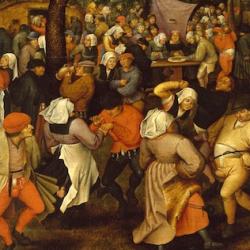INTRODUCTION
The Spirit is the “Paraclete,” a Greek word often translated as “comforter.” But the Spirit doesn’t just soothe us. When the Comforter comes, He comes to convict (John 16:8-11). The Spirit is the Spirit of discipline.
THE TEXT
“These things I have spoken to you that you should not be made to stumble. They will put you out of the synagogues; yes, the time is coming that whoever kills you will think that he offers God service . . . .” (John 16:1-14).
THE PARACLETE
Jesus’ promise that the “Helper” or “Paraclete” will come is surrounded by predictions about future persecution. The disciples are Jesus’ followers, and so they will suffer as Jesus did. The world will hate and persecute the disciples as they hated and persecuted Jesus (15:18-23). As Jesus goes on, it becomes clear that He is talking about hatred and persecution from Jews (“their law,” 15:25; “synagogue,” 16:2). In that context, the Spirit will have two effects: He will empower the disciples as bold witnesses in the face of hostility (15:26-27), and he will convict the world, i.e., the Jews (16:8-11). This specific promise is consistent with the whole Bible’s teaching about the Spirit. Micah the prophet is filled with the Spirit to make Israel know his sin (Micah 3:8), and Hebrews tells us the word of God is the sword of the Spirit that cuts into us and exposes our hearts (Hebrews 4:12-13). The Spirit encourages us, but the Spirit is also fire that purifies us.
DISCIPLINE
Pentecostal parenting, then, includes exposure and conviction of sin, as well as discipline. As we noted a few weeks ago, discipline is an act of love (Proverbs 13:24; Hebrews 12:1-13). Discipline is motivated by love, and should be carried out with kindness and gentleness. According to the Proverbs, the rod – physical correction – is a proper means of discipline for those who lack understanding (10:13), to purge folly (22:15), to rescue souls from Sheol (23:14), to give wisdom (29:15). Words of correction, reproof, and rebuke are also means for discipline (29:15). Many of the Proverbs that talk about reproof emphasize the fact that those who are corrected should receive correction well (1:23-25; 5:12; 10:17; 12:1; 13:18; 15:10; etc). Through our faithful use of words and the rod, the Spirit of wisdom drives out folly and trains our children in the wisdom that is Jesus Christ Himself.
TRUSTING THE SPIRIT
In every area of Christian living, we have to remember that the Spirit is the One bringing us to maturity. We must be diligent, but it doesn’t depend on us but on the grace of God. This has several specific applications to parenting. At times, for instance, we cannot be certain if our children are telling us the truth or hiding serious sin. We should expect the Spirit to do His work of convicting. At times, too, spanking and correcting doesn’t seem to have any effect, and we are tempted to give up. Especially when we cannot perceive results, we must trust the Spirit to be working through us and wait to see fruit. The Christian life – and Christian parenting – are faith from first to last, faith in the Risen Christ and in the ongoing work of the Spirit of Christ.











